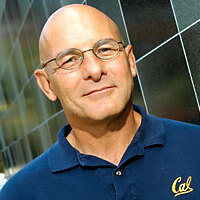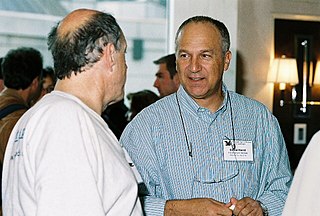
Alan Curtis Kay is an American computer scientist best known for his pioneering work on object-oriented programming and windowing graphical user interface (GUI) design. At Xerox PARC he led the design and development of the first modern windowed computer desktop interface. There he also led the development of the influential object-oriented programming language Smalltalk, both personally designing most of the early versions of the language and coining the term "object-oriented." He has been elected a Fellow of the American Academy of Arts and Sciences, the National Academy of Engineering, and the Royal Society of Arts. He received the Turing award in 2003.

Federico Faggin is an Italian-American physicist, engineer, inventor and entrepreneur. He is best known for designing the first commercial microprocessor, the Intel 4004. He led the 4004 (MCS-4) project and the design group during the first five years of Intel's microprocessor effort. Faggin also created, while working at Fairchild Semiconductor in 1968, the self-aligned MOS (metal-oxide-semiconductor) silicon-gate technology (SGT), which made possible MOS semiconductor memory chips, CCD image sensors, and the microprocessor. After the 4004, he led development of the Intel 8008 and 8080, using his SGT methodology for random logic chip design, which was essential to the creation of early Intel microprocessors. He was co-founder and CEO of Zilog, the first company solely dedicated to microprocessors, and led the development of the Zilog Z80 and Z8 processors. He was later the co-founder and CEO of Cygnet Technologies, and then Synaptics.
In systems engineering, dependability is a measure of a system's availability, reliability, maintainability, and in some cases, other characteristics such as durability, safety and security. In real-time computing, dependability is the ability to provide services that can be trusted within a time-period. The service guarantees must hold even when the system is subject to attacks or natural failures.

David Andrew Patterson is an American computer pioneer and academic who has held the position of professor of computer science at the University of California, Berkeley since 1976. He announced retirement in 2016 after serving nearly forty years, becoming a distinguished software engineer at Google. He currently is vice chair of the board of directors of the RISC-V Foundation, and the Pardee Professor of Computer Science, Emeritus at UC Berkeley.
A Byzantine fault is a condition of a computer system, particularly distributed computing systems, where components may fail and there is imperfect information on whether a component has failed. The term takes its name from an allegory, the "Byzantine generals problem", developed to describe a situation in which, to avoid catastrophic failure of the system, the system's actors must agree on a concerted strategy, but some of these actors are unreliable.

Barbara Liskov is an American computer scientist who has made pioneering contributions to programming languages and distributed computing. Her notable work includes the introduction of abstract data types and the accompanying principle of data abstraction, along with the Liskov substitution principle, which applies these ideas to object-oriented programming, subtyping, and inheritance. Her work was recognized with the 2008 Turing Award, the highest distinction in computer science.
Brian Randell DSc FBCS FLSW is a British computer scientist, and emeritus professor at the School of Computing, Newcastle University, United Kingdom. He specialises in research into software fault tolerance and dependability, and is a noted authority on the early pre-1950 history of computing hardware.
Fault tolerance is the ability of a system to maintain proper operation despite failures or faults in one or more of its components. This capability is essential for high-availability, mission-critical, or even life-critical systems.
The International Conference on Dependable Systems and Networks is an annual conference on topics related to dependable computer systems and reliable networks. It typically features a number of coordinated tracks, including the main paper track, several workshops, tutorials, industry session, a student forum, and fast abstracts. It is sponsored by the IEEE and the IFIP WG 10.4 on Dependable Computing and Fault Tolerance. DSN was formed in 2000 by merging the IEEE International Symposium on Fault-Tolerant Computing (FTCS) and the IFIP International Working Conference on Dependable Computing for Critical Applications (DCCA). The instance number for DSN is taken from FTCS which was first held in 1980 and annually thereafter.

David Harel is a computer scientist, currently serving as President of the Israel Academy of Sciences and Humanities. He has been on the faculty of the Weizmann Institute of Science in Israel since 1980, and holds the William Sussman Professorial Chair of Mathematics. Born in London, England, he was Dean of the Faculty of Mathematics and Computer Science at the institute for seven years.
Keith Marzullo is the inventor of Marzullo's algorithm, which is part of the basis of the Network Time Protocol and the Windows Time Service. On August 1, 2016 he became the Dean of the University of Maryland College of Information Studies after serving as the Director of the NITRD National Coordination Office. Prior to this he was a Professor in the Department of Computer Science and Engineering at University of California, San Diego. In 2011 he was inducted as a Fellow of the Association for Computing Machinery.

Leon Ong Chua is an American electrical engineer and computer scientist. He is a professor in the electrical engineering and computer sciences department at the University of California, Berkeley, which he joined in 1971. He has contributed to nonlinear circuit theory and cellular neural network theory.
Fred Barry Schneider is an American computer scientist, based at Cornell University, where he is the Samuel B. Eckert Professor of Computer Science. He has published in numerous areas including science policy, cybersecurity, and distributed systems. His research is in the area of concurrent and distributed systems for high-integrity and mission-critical applications.
The William C. Carter Award is a technical award presented annually since 1997 to recognizing an individual who has made a significant contribution to the field of dependable and secure computing throughout his or her PhD dissertation. It is named after, and honors, the late William C. Carter, an important figure in the field. The award is sponsored by IEEE Technical Committee on Fault-Tolerant Computing (TC-FTC) and the IFIP Working Group on Dependable Computing and Fault Tolerance.
Ravishankar K. Iyer is the George and Ann Fisher Distinguished Professor of Engineering at the University of Illinois at Urbana-Champaign. He is a specialist in reliable and secure networks and systems.

Prabhakar Raghavan is a business executive and former researcher of web information retrieval. He is a senior vice president at Google, where he is responsible for Google Search, Assistant, Geo, Ads, Commerce, and Payments products. His research spans algorithms, web search and databases. He is the co-author of the textbooks Randomized Algorithms with Rajeev Motwani and Introduction to Information Retrieval.
Mootaz Elnozahy is a computer scientist. He is currently a professor of computer science at University of Texas at Austin. He was a professor of computer science at the computer, electrical and mathematical science, and engineering (CEMSE) division at King Abdullah University of Science and Technology from 2012-2024. He previously served as Special Advisor to the President and Dean of CEMSE. Elnozahy's research area is in systems, including high-performance computing, power-aware computing, fault tolerance, operating systems, system architecture, and distributed systems. His work on rollback-recovery is now a standard component of graduate courses in fault-tolerant computing, and he has made seminal contributions in checkpoint/restart, and in general on the complex hardware-software interactions in resilience.
Lorenzo Alvisi is an Italian computer scientist and Tisch University Professor at Cornell University. Prior to joining Cornell, he was a University Distinguished Teaching Professor and the holder of the Endowed Professorship #5 at the University of Texas at Austin. His research focuses on distributed systems and dependability. He holds a laurea in Physics from the University of Bologna (1987), and an MS and PhD in Computer Science from Cornell University. He is a fellow of the Association for Computing Machinery since 2010 and of the Institute of Electrical and Electronics Engineers since 2016.
Daniel P. Siewiorek is an American computer engineer and computer scientist, currently the Buhl University Professor Emeritus of Electrical and Computer Engineering and Computer Science at Carnegie Mellon University.
Kishor Shridharbhai Trivedi is an Indian-American computer scientist who is currently the Hudson Chaired Professor in department of electrical and computer engineering at Duke University.






